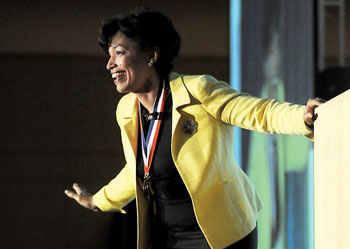As the disabled daughter of a single mother struggling to make ends meet, Bonnie St. John was floored when a rich, white friend invited her to go skiing with her family.
"How many of you would have the guts to turn to your one-legged, black friend when you're 15 years old and say, 'Skier!'" she asked.
But taking that leap of faith ignited a passion in St. John, whose underdeveloped right leg had been amputated just above the knee when she was 5.
St. John ended up taking time away from college to become a "ski bum," balancing on a single ski and racing down the slopes.
She qualified for the 1984 Paralympics team and came away from the competition in Austria with bronze medals and one silver. She broke barriers as the first African-American to win Olympic medals in ski racing.
She wore the medals proudly at Siskin Hospital for Physical Rehabilitation's "Possibilities" luncheon Wednesday at the Chattanooga Convention Center. The annual fundraiser highlights people who have overcome obstacles to push the boundaries of life's possibilities. The event also raises money for Siskin patients who can't afford to pay for their care.
St. John graduated from Harvard University, was named a Rhodes scholar and was appointed to the White House National Economic Council during the Clinton administration. She has written books and appeared on talk shows ranging from "The View" to "Good Morning America."
St. John exemplifies the message of the Possibilities luncheon, Siskin President and CEO Bob Main said after the event.
"You can really become anything you want to become, and she's a living example of that," he said. "That's the whole reason this lunch started eight years ago, was to demonstrate to Chattanooga that there is life after disability."
Despite her undeniable talents and success, St. John said she doesn't hesitate to call herself disabled.
"I like to consider myself as a person with a disability, because I like to redefine how other people think about disability and what's really possible," she said.
The family and rehabilitative care specialists who helped her push through pain as a child instilled in her a belief in her own potential, she said.
"So much of my life I struggled with the concept of trying to be normal," she said. "Somewhere along the line in my life I realized I'll never be normal, but I can be so much more. I can be extraordinary."

